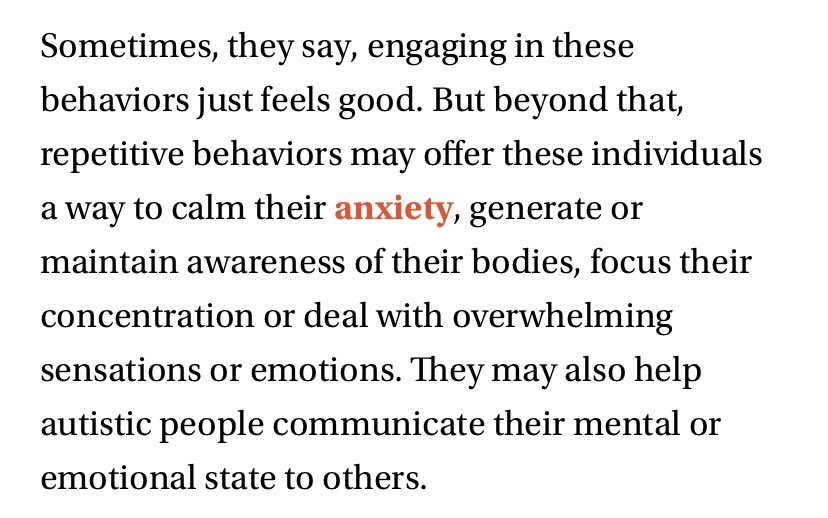
In one of my classes yesterday, we were talking about Sufi people who spin and chant repetitively as a form of worship & spiritual practice.
It made me think about how repetitive movement & vocalization is present in every religion I can think of (Praying the rosary, etc.)
It made me think about how repetitive movement & vocalization is present in every religion I can think of (Praying the rosary, etc.)
In those contexts, repetitive movements like spinning in circles, rocking back and forth, touching & moving beads, etc. are not only socially acceptable- they’re praised as signifiers of devoted worship.
Chanting is the same. Repeating a word, phrase, or script over and over.
Chanting is the same. Repeating a word, phrase, or script over and over.
To me as an autistic person, all of this is familiar.
Stimming and echolalia are the words used to describe the same actions listed above, when done by autistic people.
Our repetitive actions are rarely praised. Often, we are punished or forced to stop instead.
Stimming and echolalia are the words used to describe the same actions listed above, when done by autistic people.
Our repetitive actions are rarely praised. Often, we are punished or forced to stop instead.
Chanting & repetitive movements induce altered states of consciousness in spiritual practitioners, and can be used to assist with emotional regulation.
Why would that change just because the person doing the repetition is autistic & not explicitly praying or worshiping?
Why would that change just because the person doing the repetition is autistic & not explicitly praying or worshiping?
What if autistic stimming and echolalia serves the same purpose as repetition in religious practice?
After rocking back and forth for over 15 minutes, I definitely feel like I’ve entered an altered state.
It makes me calmer, more regulated, more in-tune with myself.
After rocking back and forth for over 15 minutes, I definitely feel like I’ve entered an altered state.
It makes me calmer, more regulated, more in-tune with myself.
Autistic behaviors are human behaviors, and therefore are present all around us.
I wonder how many people who regularly pray the rosary have tried to stop autistic people from flapping our hands.
I wonder if they were aware of their hypocrisy.
I wonder how many people who regularly pray the rosary have tried to stop autistic people from flapping our hands.
I wonder if they were aware of their hypocrisy.
This is an excerpt from an article about autistic stimming (spectrumnews.org/news/repetitiv…) 

Does “calming anxiety, generating or maintaining awareness of the body, focusing concentration, and dealing with overwhelming emotions or sensations” sound like something to you?
To me it sounds a lot like meditation, or ritualistic prayer.
The connection is important.
To me it sounds a lot like meditation, or ritualistic prayer.
The connection is important.
I’m not saying that stimming and echolalia are inherently spiritual.
But I do think they often serve the same purpose as more culturally accepted forms of repetitive behavior.
Some other analogies might be playing a repetitive game or sport, doing a repetitive dance, etc.
But I do think they often serve the same purpose as more culturally accepted forms of repetitive behavior.
Some other analogies might be playing a repetitive game or sport, doing a repetitive dance, etc.
This reframing is really important for anyone who interacts with autistic people and wonders why we stim.
We stim for the same reasons anyone else does.
It’s just that we do it more often (and usually more intensely), because we have more information to process and regulate.
We stim for the same reasons anyone else does.
It’s just that we do it more often (and usually more intensely), because we have more information to process and regulate.
• • •
Missing some Tweet in this thread? You can try to
force a refresh








